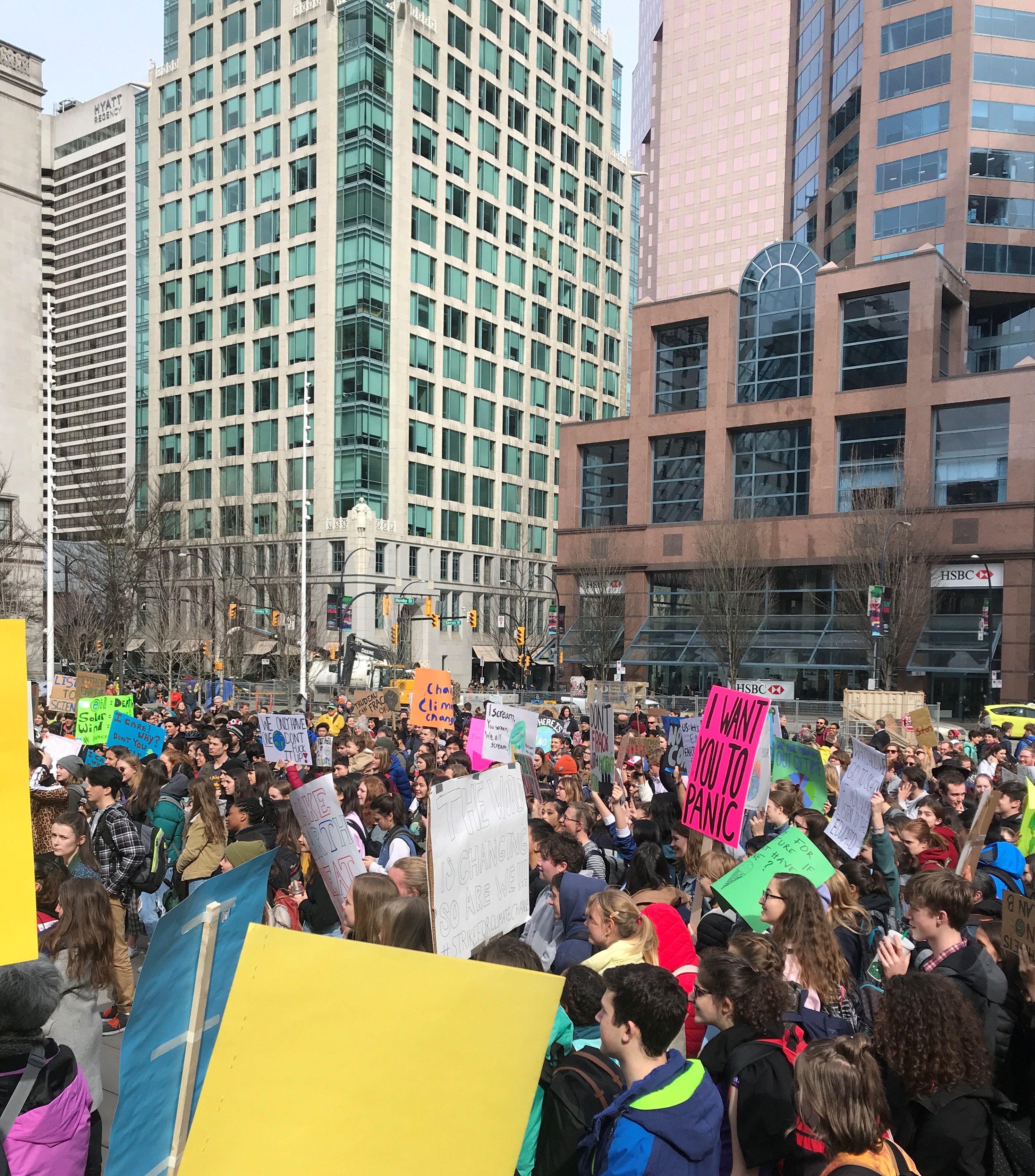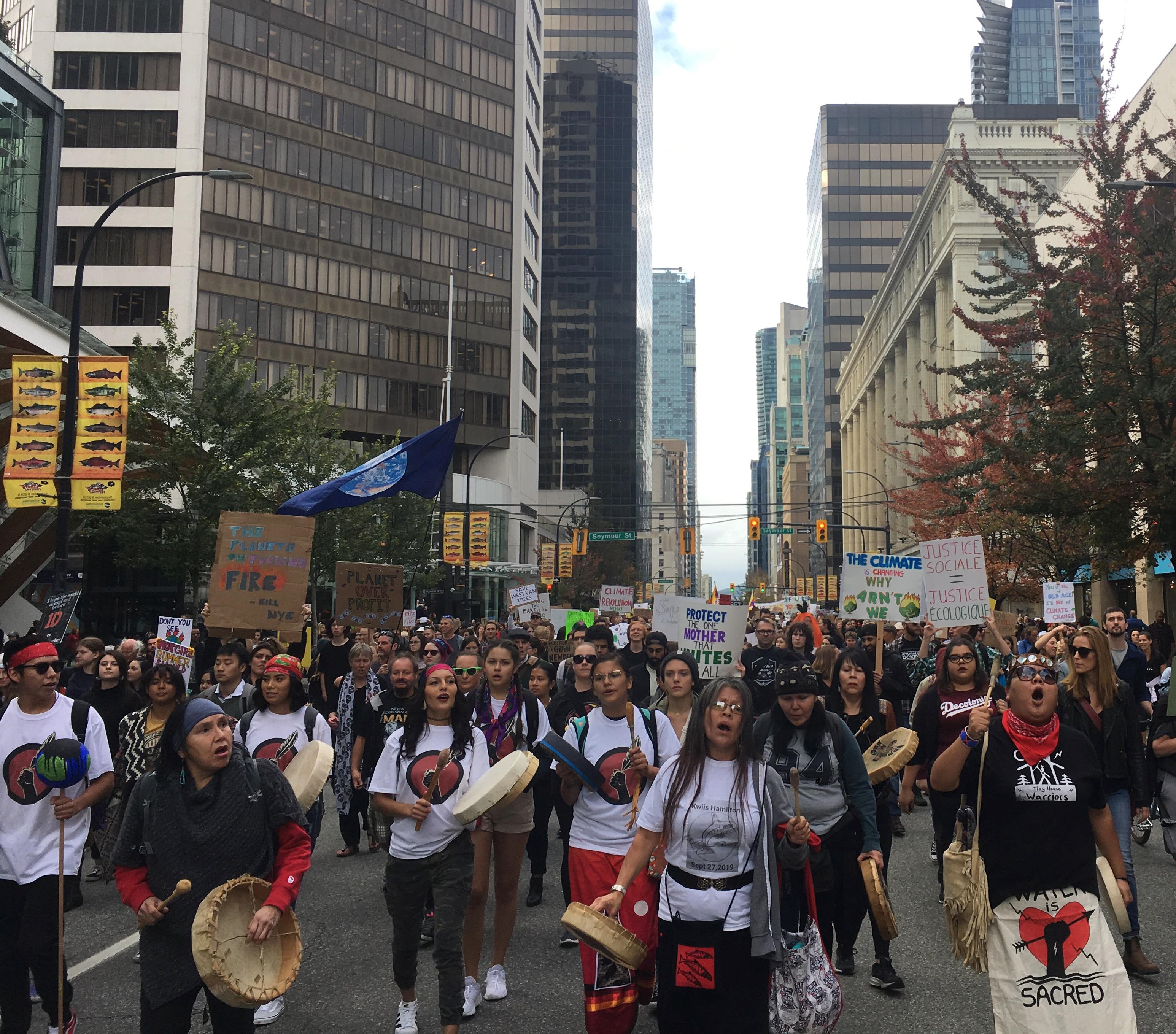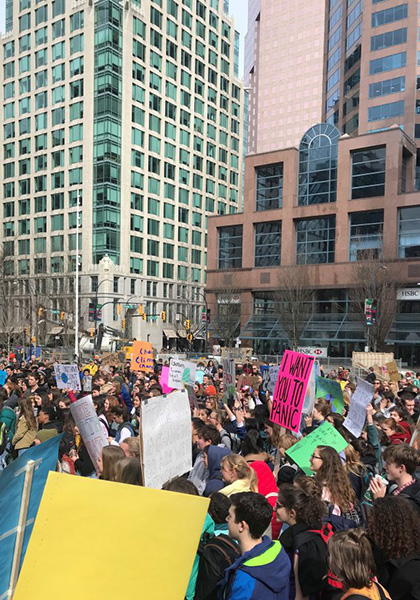Climate change discussions are becoming more urgent and we are witnessing more of its effects. In this blog post, Tides Canada’s Benjamin Ger reflects on Vancouver’s recent climate demonstrations and lessons learned as we work towards a healthier environment.
—

As I walked through Vancouver’s crowded downtown, over shut-down bridges and by trucks honking in support, I couldn’t help but draw parallels between BC’s Operation Solidarity of the 1980’s – a coalition movement that buckled when government and labour officials reached an agreement that was not representative of all coalition members – the Winnipeg general strike of 1919, and today’s movement for climate justice. As so many have done before us, youth and adults alike raised their voices and protest signs in solidarity with the Black, Indigenous and People of Color (BIPOC), labour, environmental, climate, tenant, and anti-war liberation movements of the past and present.
With party leaders of all stripes, organizations with differing theories of change, and individuals with diverse perspectives all marching together, a clear sign was sent to Ottawa and the world: action on climate change must be a top priority. Especially in the wake of Greta’s recent visit to Vancouver, momentum for climate action is at a palpable high. The approach(es) that we ultimately take remains unclear, but I hope these reflections help guide our thoughts as we continue to push for a brighter, more just, and livable future.

Policy Must Play a Central Role in Our Debates, Organizing, and Action
While our movements grow in strength, we must inevitably begin to hone our vision and prioritize our asks. As much as signaling and resistance have value, they ultimately will not solve the crisis we are facing. In the words of Greta Thunberg, “don’t invite us here to just tell us how inspiring we are without actually doing anything.” Groups like Our Time have built on substantive programs for which to advocate, like the Green New Deal, sharpening the asks of their organizing and advocacy efforts beyond elevating the conversation. As Canadians take to the streets, advocate in the courts, and generally push for change, we must remain committed to making our asks as clear as our voices are loud.
Nothing Drives Change Like Organizing, Cooperation, & Community Leadership

As has been shown time and time again, organizing gets the goods. All throughout the 1960’s and 70’s, an organized populous, in the United States in particular, forced the hands of government on numerous occasions, winning huge victories for the working class, black civil rights, and global peace. The power of cooperation in policy and civil society was being re-realized in the form of expanding government services and human rights in the face of extreme institutional fightback, all on the backs of a strong culture of community resilience. These instances showed the power of community-led change.
Indigenous Women Lead the Way and Must Be Recognized & Supported
“It’s time for action” were the words of 13-year-old Wiikwemkoong water protector Autumn Peltier to The National Post ahead of her second speech to the United Nations (UN) in 2018.
As is often the case, and too often ignored, it is Indigenous women who have laid the foundation and stood on the frontlines while white settlers reap the praise and spotlight. While Greta Thunberg receives a near constant stream of accolades and media love, for notably amazing work, the words of Autumn Peltier and others are oft discarded by settler institutions and individuals. First Nations have and continue to be disproportionately targeted by the harms of climate change and must be centered in our fight against it.
I ask that anyone reading this take the additional step of reading the interview, ‘We Are Nations:’ What Environmental Justice Looks Like for Indigenous People. In it, Indigenous scholar and journalist Dina Gilio-Whitaker speaks on the importance of land & sovereignty in relation to the struggle for climate justice, and the need to look to and value the traditional knowledge as a source of solutions to the climate crisis.
Final Thoughts
I ask you to think on how these takeaways impact your experience. For those of you at the September 27 march or the October 25 strike, consider who you remember most, and why you attended. Was it the matriarchs of the Tiny House Warriors, fueling the crowd with music and speeches? Was it to support their fight for sovereignty and a Green New Deal, or was it to see Greta? Think about how you engage with colonial interpretations of land ownership during and outside of your climate activism. To the organizers, it is imperative that all the above remains on your minds. Your achievements have been grand, and you have pushed the dial substantively. But as past movements like Operation Solidarity have taught us, our efforts hang in a tight balance between success from cooperation, and failure by exclusion, oppression, coopting, or ideological rifts.
I attended this protest on my own time and not in my capacity as Tides Canada staff. My views are my own and do not necessarily reflect the views and opinions of Tides Canada.
Benjamin Ger is the Administrator, Shared Platform and Development at Tides Canada.

